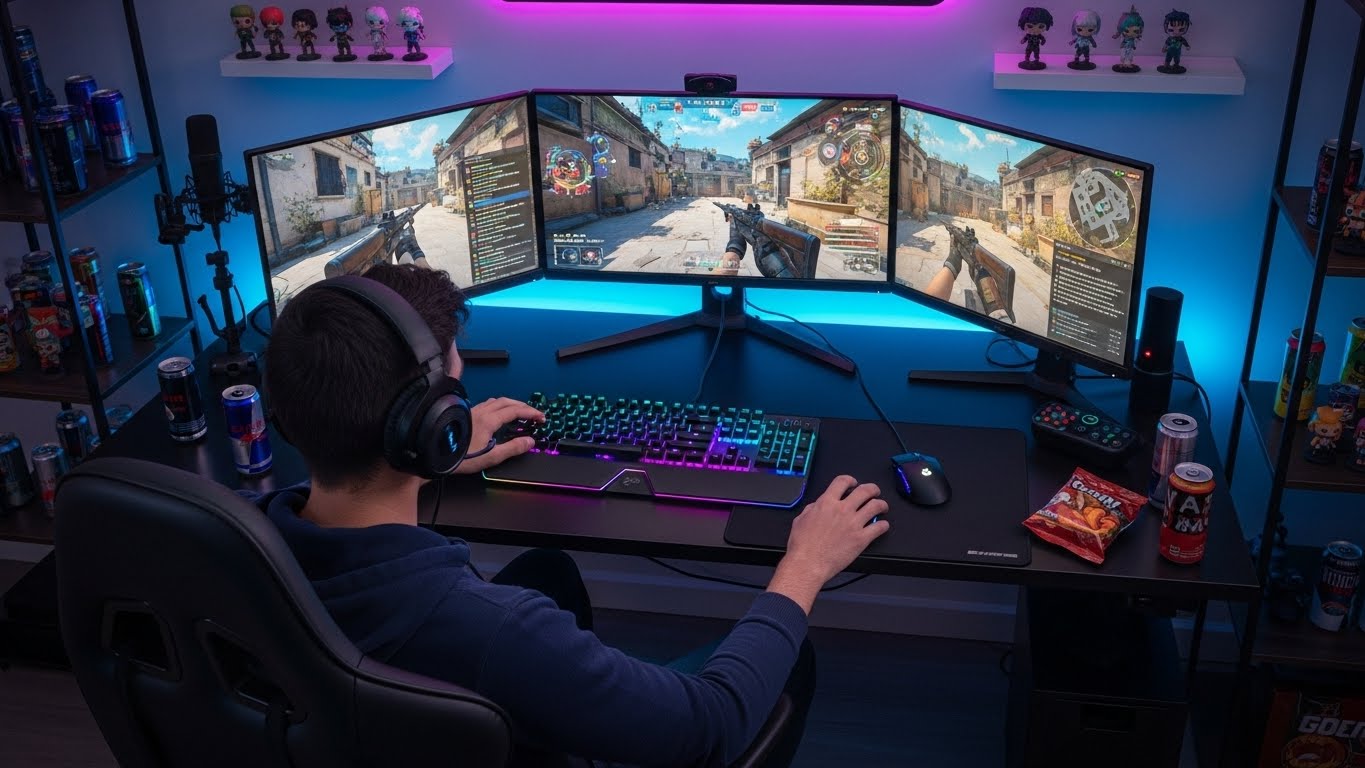Gaming has transformed dramatically over the past few decades, evolving from simple, pixelated entertainment into massive, fully immersive worlds. Today, players are not just interacting with a screen; they are becoming part of the story, making decisions that can alter the outcome of the game. This blog post delves into how gaming has evolved, its current state, and where it might go in the future.
The Humble Beginnings of Gaming
The journey of video games began in the late 20th century, with simple arcade games like Pong and Space Invaders. These early games were limited in their graphics, sound, and mechanics but captured the imagination of players worldwide. It was a time when gaming was primarily for fun and recreation, and the technology behind it was just beginning to take shape.
Home consoles like the Atari 2600 helped bring games into living rooms, allowing players to enjoy their favorite games without having to visit arcades. The simplicity of these early games laid the foundation for what would become a multi-billion-dollar industry.
The Rise of 3D Graphics and Console Wars
In the 1990s, gaming underwent a monumental shift with the introduction of 3D graphics. The release of the Sony PlayStation, Nintendo 64, and Sega Saturn marked a new era in gaming, offering more complex worlds, better visuals, and deeper stories. The idea of “console wars” began, as fans debated which system provided the best gaming experience. The graphics, sound, and gameplay quality of games like Super Mario 64 and Final Fantasy VII showcased what the future of gaming could look like.
It was also during this time that gaming expanded beyond just a pastime into a cultural phenomenon. More and more people, from kids to adults, were becoming gamers, and the industry was taking its first steps toward mainstream popularity.
The Online Revolution
As the internet became more widespread, gaming experienced a second revolution: online multiplayer gaming. Games like Warcraft, Counter-Strike, and Halo introduced players to the world of online play, where they could compete against others from all over the globe. This connectivity transformed gaming from a solo or local multiplayer experience to a global community.
The introduction of services like Xbox Live and PlayStation Network allowed gamers to interact, form teams, and compete in a new, dynamic environment. This period also marked the rise of online communities, where gamers could share tips, strategies, and even make lifelong friends.
The Era of Open Worlds and Storytelling
The 2000s and 2010s brought a focus on narrative-driven games and expansive open worlds. Titles like The Elder Scrolls V: Skyrim, Red Dead Redemption 2, and The Witcher 3 blurred the lines between gaming and interactive storytelling. These games gave players vast, open environments to explore, often with hundreds of hours of gameplay, side quests, and character development.
Games were no longer just about completing levels or achieving high scores. They became about experience—immersing players in rich, well-developed worlds where every choice mattered. Developers began to focus on creating emotional connections between players and characters, with stories that could rival Hollywood blockbusters.
The Growth of Esports and Streamers
In recent years, gaming has become a legitimate form of competition, with the rise of esports. Professional gamers now compete in massive tournaments for millions of dollars in prizes, with games like League of Legends, Dota 2, and Fortnite leading the charge. Esports have helped elevate gaming to the level of other professional sports, with dedicated fans, sponsorships, and global viewership.
At the same time, streaming platforms like Twitch and YouTube Gaming have given rise to a new wave of celebrity gamers. Streamers like Ninja, Pokimane, and Shroud have become household names, with millions of fans tuning in daily to watch their gameplay, interact with them, and even support them financially. This has turned gaming into a cultural industry with enormous influence, extending far beyond the confines of the gaming community.
Virtual Reality and the Future of Gaming
As we move into the next phase of gaming, virtual reality (VR) is becoming an increasingly important part of the conversation. VR headsets like the Oculus Rift and PlayStation VR are giving gamers the chance to experience games like never before. With VR, players are no longer staring at a screen; they’re stepping into a 360-degree world, interacting with it in ways that were previously impossible.
The potential for VR in gaming is immense. Imagine walking through ancient cities, engaging in full-scale battles, or solving complex puzzles in a completely immersive environment. As the technology improves and becomes more accessible, the boundaries between the real world and the virtual world will continue to blur.
Additionally, augmented reality (AR) is also making its mark on the gaming world. Games like Pokémon GO have already shown how AR can bring the gaming experience into the real world, and we can expect even more innovative AR games in the future.
The Impact of Mobile Gaming
Another game-changer in the industry has been the rise of mobile gaming. Smartphones have made gaming accessible to virtually anyone, anywhere. Casual games like Candy Crush and Clash of Clans have introduced a massive audience to gaming, while more immersive titles like PUBG Mobile and Genshin Impact show that mobile platforms are capable of offering high-quality gaming experiences.
Mobile gaming has also led to the democratization of gaming, allowing people from different walks of life to enjoy games without the need for a dedicated console or PC. Whether waiting for a bus or relaxing at home, mobile gaming provides instant access to entertainment.
Conclusion: Gaming for All
The evolution of gaming is far from over. With new technologies, changing player expectations, and the constant desire to push the boundaries of creativity, the future of gaming promises to be even more exciting. From the humble beginnings of pixelated graphics to the fully immersive experiences of today, gaming has become a cornerstone of modern entertainment, and its influence continues to grow. Whether you’re a casual player, a competitive gamer, or someone who just enjoys a good story, gaming offers something for everyone.



